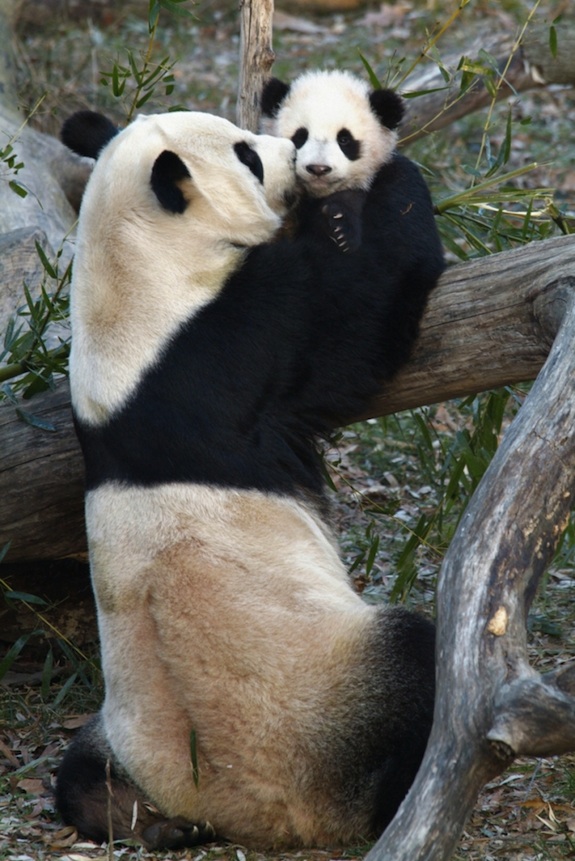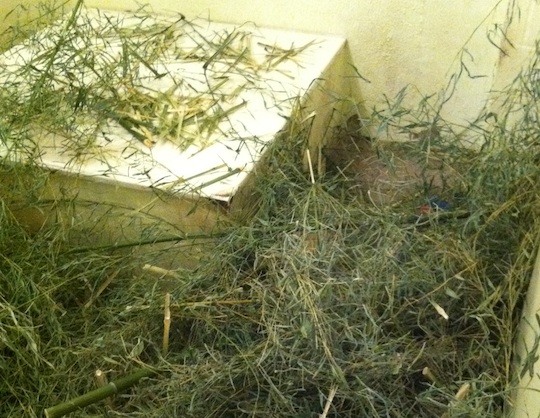Zoo’s Panda May Be Preggers
At long last, is there a baby panda in the Zoo’s future?
![]()

Mei Xiang may be pregnant with another baby. The cub would join older brother Tai Shan, born in 2005. Jessie Cohen, National Zoo
Hormone levels for the female giant panda, Mei Xiang, are up, according to Zoo officials. This could mean a visit from the stork, or it could be another in a series of “pseudopregnancies,” according to the Zoo. Giant pandas are among the rarest animals in the world and the Zoo has worked with researchers to try to effectively breed more.
Mei Xiang has had five pseudopregnancies in a row and last gave birth July 9, 2005. After artificial insemination in April of this year, officials are hoping her only cub will soon have a younger sibling within 40 to 50 days. She has reportedly begun nesting.

Veterinarians monitor the panda during April’s artificial insemination. National Zoo
Panda keeper Juan Rodriguez says Mei Xiang has been shredding bamboo and collecting it in a corner of her den since the beginning of August. He’s noticed other behavioral changes, including a slowness to react to his calls. “We don’t have a scientific name for it but spaciness is how we describe her behavior.” Eventually, he explains, she will not want to leave her den at all as the birth approaches.
Because of the many false alarms, Rodriguez says, “We try to stay subdued over here.”
The team began doing ultrasounds once a week about a month ago but the soonest an ultrasound can give a definitive answer (and even then, it’s not 100 percent) is two weeks prior to the birth. Visitors to the Zoo can see a bald spot on Mei Xiang’s abdomen from where her fur had to be shaved for the ultrasound. The team has also been tracking her hormones with weekly urine samples that will switch to daily in a few weeks. Rodriguez says they are treating it as a real pregnancy but that the team isn’t celebrating yet.
“That’s the thing with pseudopregnancies and real pregnancies, there’s really no difference,” he explains. The phenomenon of pseudopregnancies is something scientists are still asking questions about. Rodriguez says it could very well be part of their natural history or a result of environmental cues.
Even after hormone levels drop off in a pseudopregnancy, animals can still exhibit changed behaviors. Rodriguez says after last year’s false alarm, Mei Xiang continued nesting for several days.
Rodriguez says, “If she gives birth we’re ready to rock, but we also don’t want to get our hopes up too high.”

Mei Xiang and Tian Tian in 2008. Photo by Mehgan Murphy, National Zoo.

Messing around. Jessie Cohen, National Zoo.

Giant Panda Mei Xiang’s den during a previous pseudopregnancy. Photo courtesy National Zoo Panda Cam
This post was updated at 1:23 p.m.
/https://tf-cmsv2-smithsonianmag-media.s3.amazonaws.com/accounts/headshot/Leah-Binkovitz-240.jpg)
/https://tf-cmsv2-smithsonianmag-media.s3.amazonaws.com/accounts/headshot/Leah-Binkovitz-240.jpg)